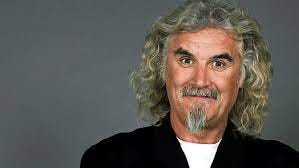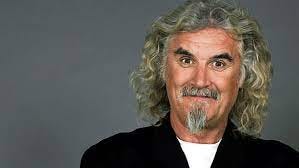Welcome to the 8th edition of Richard Flohil’s Stories from the Edge of Music. It’s a little scrappy this time, since your scribe has been diagnosed with pneumonia, and will hopefully be on the road to recovery as you read this.
Warning: If the F-word upsets you, or you're dismayed by political invective, or if you don’t laugh at fart jokes, maybe you should pass on this week’s Stories.
Normally, this is where Flohil suggests you support him my taking out a paid subscription (if you’ve not done so already). But, to be honest, he’s too tired to explain the whole thing. Next time, okay?
#8 Billy Connolly: I promise, he won’t say “fuck” on television
The first time I did publicity in Toronto for Billy Connolly, the brilliant Scottish comedian and actor, many people in 1975 refused, point blank. “What if he says ‘fuck’ on air?” asked a nervous talent coordinator at an early morning television show.
I protested that Connolly was a consummate professional, who knew that he could never get away on television with what he did on stage. A one-time Glasgow shipyard welder, he became a folk singer in a duo called the Humblebums.
Three records later, when his between-song banter was earning more applause that the songs, Connolly began a solo career as a comedian. He had acquired a huge following of expat Scots in Canada, most of them from working-class backgrounds. In Toronto, as a near-unknown, he had played eight weeks in a downtown pub called the Windsor House.
Cheerfully profane, Connolly would open his show by roaring the F-word, and then telling the audience where they could go if they were offended. “Look, it’s just fuckin’ punctuation, alright?”
The next time Connolly returned, a few years later, he had broadened his appeal, his Scottish accent was softened, and he had broken through as a remarkably strong film actor. With well over a dozen concerts booked from Vancouver to Halifax, I suggested to Jim Skarratt, the promoter of the tour, that he start by doing a day of interviews in Toronto — with the emphasis on national media.
He agreed, and Connolly arrived in Toronto, with his manager, two days before the first show, set for Vancouver. The promoter booked a limo for the day, and it drew up outside my house at 6:00 a.m. Today, there are even more ridiculous vehicles to carry celebrities, but this one was equipped with TV, a video machine, a bar, room for nine people on plush leather sofas, and neon lighting in the roof that changed colour when the car moved.
Off to Sutton Place, then the hotel where major stars stayed (and now, alas, yet another condo building). He’s not going to like this car, I thought. After all, the man’s an ex-welder from Glasgow whose politics were closer to those of Karl Marx than, say, the average left-winger. This car is way over the top.
After a quick greeting in the lobby, I escorted him to the car. Settling in, he stretched his long legs, gazed around the interior, and said: “Fuck, isn’a show business wonderful? You get to ride around inside a fuckin’ jukebox!”
First up was Canada AM (which had refused to have him on only a few years before), then CBC Radio with Peter Gzowski, then back up to Global TV for an interview with Peter Feniak, then time with a reporter from The Globe and Mail along for the ride. After that, lunch at Sutton Place with Greg Quill of The Toronto Star. Along the way, he cheerfully handled three or four telephone interviews from the limousine and then we hit Canadian Press, the national news agency. He was hilarious with some interviewers, thoughtful and quiet with others.
Last thing on the list: an interview on The Mike Bullard Show. Taped at six o’clock in the evening at an old Masonic Temple that had once housed the Rockpile, then the hottest concert venue in Toronto, I was a little apprehensive. And Connolly was, understandably, a little tired by now.
Bullard, a prematurely bald man who looked like a comfortably well-off beaver, has since disappeared from the Canadian media world. Before his TV career, he’d been a stand-up comedian. Putting comedians together on television shows can sometimes be disastrous.
Not this time, however: Bullard was considerate, thoughtful, and respectful. “So,” he asked, “have you won any awards for your acting work?”
“No way, Judi Dench wins all of them,” Connolly replied, “and that’s just fine with me.” Dame Judi had played Queen Victoria in his best film to date, Mrs. Brown. “But I did get nominated in the Scottish division of the British Radio and Television Awards, for a documentary I’d done — and you get a prize at that one just for showing up.
“The lady MC started to list the nominees, and I was halfway out of my seat with my speech in my hand when she said ‘Oh, guess what? I won for my documentary on lesbian prostitutes in Glasgow!’”
Connolly leaned forward in his chair and told Bullard: “Don’t you just hate feminist films? Too dull, too boring, and too damn politically correct...” Bullard, looking serious, responded: “I’m glad you mentioned that — I allowed my wife to rent one of those films last week…” Connolly almost fell off his seat, choking with laughter.
After the long, long day, Connolly, his manager and I repaired to an Indian restaurant, and we got into a discussion about — of all things — British radio comedians in the war. “There was a show with Tommy Handley,” Connolly recalled. “But I canna remember who else was on that show…”
At he next table, a middle-aged couple were finishing their meal. The gentleman leaned over. “I know who you are,” he said, “and I don’t want to impose, but the name you’re looking for is…”
“Well, pull your table over,” Connolly said. “So, where are you from?” Tourists from England, they had been to Niagara Falls, and were returning home the following day. They sat with us for half an hour — and you know that their best memory of two weeks in Canada was meeting a famous, friendly, amiable, and wonderfully profane Scottish comedian.
Now knighted, and 80 years old, Sir Billy Connolly lives in Florida, and he will never perform again. Diagnosed with Parkinson’s disease in 2013, he is reported to suffer from Alzheimers. He formerly lived in Los Angeles, and for many years his friend Robin Williams lived next door. He also toured with comedian, writer (and banjo player) Steve Martin. Said his road manager: “When those guys are together I always insist on a room at the other end of the hotel. Too much banjo can drive you crazy…”
+++++++++++++++++++++++++++++++++++++++
QUOTE OF THE WEEK
This may be my imagination, a memory fragment from my World War II childhood, but I think this was a propaganda health message we all had to learn when I was, maybe, six. This week, I have been taking it most seriously:
“Coughs and sneezes spread diseases
“Catch them in your handkerchieveses”
+++++++++++++++++++++++++++++++++++++++
VIDEO LINK OF THE WEEK
Rick Mercer used to do wonderful rants on the CBC, but, alas, he was not allowed to swear.
No such inhibitions affect Tom Walker, a British actor who invented Jonathan Pie, a roving television reporter. When my late friend Al Mair sent me this, four or five years ago, pre-COVID, I actually thought it was real.
If you’re unfamiliar with Jonathan Pie, I beg you to open the link. Your invective vocabulary will increase one-hundredfold.
++++++++++++++++++++++++++++++++++++++++++++
Next week: a look ahead to next year's folk festivals. After attending more than 200 festivals since 1965, I know why your favourite “unknown” artist isn’t on your festival lineup, how political correctness shapes who will appear, and several dozen suggestions of artists who deserve to be at the festivals you go to…




